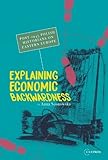Explaining economic backwardness : post-1945 polish historians on eastern Europe / Anna Sosnowska.
Material type: TextLanguage: English Original language: Polish Publisher: New York : Central European University Press, [2019]Description: 1 online resourceContent type:
TextLanguage: English Original language: Polish Publisher: New York : Central European University Press, [2019]Description: 1 online resourceContent type: - text
- computer
- online resource
- 9637326316
- 9789637326318
- Zrozumieć zacofanie. English
- 306.094 23
- HN380.7.A8
| Item type | Home library | Collection | Call number | Materials specified | Status | Date due | Barcode | |
|---|---|---|---|---|---|---|---|---|
 Electronic-Books
Electronic-Books
|
OPJGU Sonepat- Campus | E-Books EBSCO | Available |
Includes bibliographical references and index.
Description based on print version record and CIP data provided by publisher; resource not viewed.
The power structure and ownership relations of semi-peripheral socialism -- Power and society -- The issue of interest integration -- Actors of the open crisis -- The socio-cultural heritage and its structural effects -- The one-party system and the transitory society -- The message -- The chances of the new socialist alternative.
This monograph is about an exciting and valuable string in the intellectual history of Eastern Europe: the debate of leading Polish historians on the origins of the economic divisions within Europe. The work covers nearly fifty years that span between the publication of two pivotal works in 1947 and 1994. The author focuses on the works of four leading participants in the debate, Kula, Małowist, Topolski and Wyczański. The analysis provides an insightful interpretation of how local and generational experience shaped the post1945 Polish historians' notion on Eastern European backwardness, and how their debate on backwardness influenced Western historical sociology, discussion on origins of capitalism, social theories of development and dependency in peripheral areas, and image of Eastern Europe in western, Marxisminspired social science. Although created under the pressure of the adverse conditions of state socialism, censorship in particular, this scholarship, with its emphasis on international comparisons and global perspective, as well as its stress on social theory and explanations, is an important part of social science of the postwar period. Its analysis helps also to understand current differences that occasionally lead to conflicts between Europe's richest and economically most developed core and its southern and eastern peripheries.
eBooks on EBSCOhost EBSCO eBook Subscription Academic Collection - Worldwide
There are no comments on this title.

